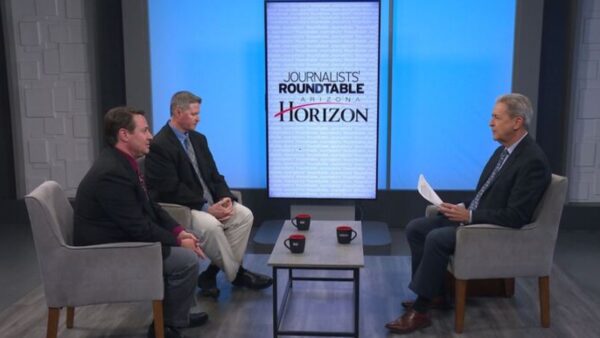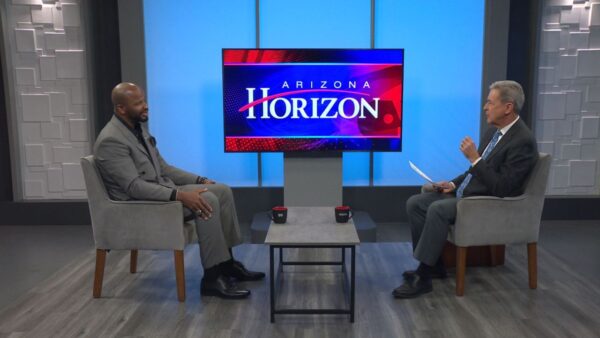President Obama issued an executive order barring discrimination against LGBT employees working for the federal government and federal contractors. Jeff Brodin, a Phoenix labor law attorney, will discuss the order and what it means to LGBT employees in Arizona.
Ted Simons: Good evening, and welcome to Arizona Horizon. I'm Ted Simons. President Obama issued an executive order yesterday that bars discrimination against LGBT employees working for federal contractors and the federal government. Here to talk about the impact on workers and businesses in Arizona is Phoenix labor law attorney Jeff Brodin. Good to have you here. Thank you so much.
Jeff Brodin: Thank you.
Ted Simons: What exactly did the President do?
Jeff Brodin: Really two big things yesterday. One was to amend executive order 11246, which prior to yesterday prohibited discrimination by federal contractors, employees of federal contractors on the basis of race, gender, religion, national origin, and sex. To those categories the president added now, with his stroke the pen yesterday, sexual orientation and gender identity. So this protects federal or employees of federal contractors, which is about 25% of the work force.
Ted Simons: And this was originally, you mentioned along racial lines and sexual lines-- This was LBJ back in that day, correct?
Jeff Brodin: Correct. It's 49 years old.
Ted Simons: Yes.
Jeff Brodin: The executive order. So pretty close to the same age as the Civil Rights Act which he signed the year before.
Ted Simons: And another one not too far along was I think President Nixon signed something regarding federal employees, that was amended as well?
Jeff Brodin: Correct. That's 11478. And that was signed by President Nixon I believe in '69 to prohibit federal government from discriminating against its employees. So federal employees gained the same protections as under the order that was signed by President Johnson. That was amended in '98 by President Clinton to add sexual orientation, and so what President Obama did yesterday is he added gender identity to the federal employee protection.
Ted Simons: And okay, so what about religious groups, especially with these federal contractors? How does that apply?
Jeff Brodin: There is no carve out as there has been proposed in some of the federal legislation. But under the Bush -- Second Bush administration, there was a religious clause that allows an employer that is a religious institution or association to favor a person based upon their religion. So say it's the Catholic church and they're looking to hire someone in their school. That they can favor someone who's Catholic, but they can't exclude someone on the basis of the protected categories.
Ted Simons: Okay. So that wasn't necessarily amended, that's still is in play, but that has changed a bit by these amendments. Correct?
Jeff Brodin: Correct. It actually might become more important to some religious institutions because of the fact that it's a category that some churches view differently, sexual orientation or gender identity than the other protected categories. And it was a topic that was lobbied, President Obama was lobbied about prior to his signing. And there were a number of religious groups in favor of not having an exclusion, keeping it as it was and there were other religious groups that argued for a total carve out, an exception.
Ted Simons: So, before yesterday, was being gay a firing offense for federal employees and/or federal contractors?
Jeff Brodin: Yes.
Ted Simons: It was? I think that would surprise a lot of people.
Jeff Brodin: When they do surveys on what -- How many employees are protected on the basis of sexual orientation in particular, most people think it's already law that you can't discriminate against someone on the basis of sexual orientation. However, that protection exists only in 18 states. And a number of municipalities, like Phoenix, and Tucson, and Tempe, there's a ballot initiative coming up in August to see if the action of the city council there will be affirmed.
Ted Simons: And you mentioned previously that there was federal legislation that was supposed to address this. Obviously that has not happened. What's going on with that?
Jeff Brodin: Sure. The law is called ENDA, and -- I'm not even sure what the acronym stands for, but there's been some form of that in Congress proposed and considered over the last 40 years. It's come the closest in this session when the senate in November passed with the bipartisan majority, passed ENDA, but it stalled in the house, it looks like it would have a majority and pass if it came to a vote, but Speaker Boehner has made it quite clear he's not going to bring it to the vote.
Ted Simons: And the fact that he's not doing that, thus the President says executive order, and the President can do this?
Jeff Brodin: Correct. This is an executive order. That's the type of thing only the President has the authority to do. It's federal employees -- It's exactly the nature of the type of action the chief executive has the authority to do.
Ted Simons: Ok. Where does Title VII play into this, if it plays into this at all? First of all, describe it Title VII.
Jeff Brodin: Title VII is the first name was the Civil Rights Act of 1964. Also then became known as Title VII by the number of the act. And that prohibits discrimination by an employer on the basis of the same categories and more, disabilities, under the Americans with Disabilities Act, some genetic information now is pulled under--But what Title VII does, it prohibits discrimination but it also gives employee as remedy. So that if they've been discriminated against or believe they have, they can go to the EEOC, file a claim, say I was discriminated against, they can get damages, the EEOC can ask for reinstatement. There's -- It's really the statute that allows the employee to get redress if they've been discriminated against.
Ted Simons: And again -- What the President did was to the employer say you can't do X, Y, and Z, what Title VII would do, would be to the employee if they do X, Y, and Z here's your remedy.
Jeff Brodin: Correct.
Ted Simons: Is that pretty much it?
Jeff Brodin: Correct. What's -- The development -- The new development in that area is that sexual orientation and gender identity are not specifically protected characteristics or categories under Title VII. But what the EEOC has currently takes a position is that Title VII does include protections against sexual orientation discrimination and gender identity under the prohibition of sex discrimination of Title VII. So as far as the EEOC is concerned, it's already there.
Ted Simons: Yeah.
Jeff Brodin: And there is a district court case that is ruled the same way. So like same-sex marriage developed through the courts, I think this is an area that's going to follow that. And the courts are likely to rule in the -- with the position of the EEOC. That's a prediction at that point, but it looks like it's a possible one.
Ted Simons: Aside from the critics who you look at this as yet another example, they see it as the President's imperial presidency and those kinds of criticisms, there's also concern that it opens employers up to the threats of costly legal action. Valid concerns? What do you think?
Jeff Brodin: Every time a category has been added to protections against discrimination, that's the argument traditionally that businesses have been - have made. This area, protection based on sexual orientation or gender identity, it's really been a sea change in the position businesses take. Businesses on the whole favor this protection. They believe it's good business to have these protections in their policies to have you know programs that really promote diversity, and this is an aspect of diversity. And I think in this day and age and economy and workplace, employers have really come to learn the value of diversity, so most employers do have policies that protect based on sexual orientation and gender identity. However, there are many who don't, and it's for those employees who may be working for one of those employers that they need the protection.
Ted Simons: Last question, impact of the executive orders on Arizona?
Jeff Brodin: Well Arizona, while 25% of the work force work for federal contractors, Arizona as a state, where we have a lot of federal contracts through the various big businesses we have in town. So that I've not seen statistics on it, but my guess is it would be even larger than 25% of the work force is now protected under the executive order.
Ted Simons: All right. Jeff, good to have you here, thanks for joining us.
Jeff Brodin: Thank you.
Jeff Brodin:Labor Law Attorney, Phoenix;




















